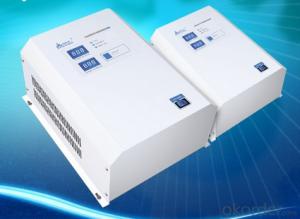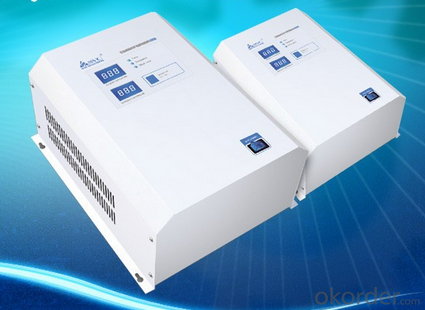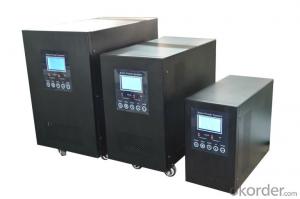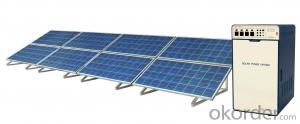Redsun Solar Energy Systems Voltage Regulator/Home SVC Wall Mount 3000VA 220V AC
- Loading Port:
- China main port
- Payment Terms:
- TT OR LC
- Min Order Qty:
- 100 carton
- Supply Capability:
- 10000 carton/month
OKorder Service Pledge
OKorder Financial Service
You Might Also Like
Home SVC Wall Mount 3000Va 220V AC Voltage Regulator
 Feature
Feature
1. Microprocessor control guarantees high reliability
2. Short Circuit, Overload, Over temperature protections provides safe and reliable performance
3. Delay function can protect the refrigerator, air conditioner and other household electrical appliances when the AC
switch frequently.
4. High voltage cut-off.
Field of Application
Applicable for equipment of computer network, household electrical appliances, medical equipment, scientific research
institutions, measuring and test equipment,calibration stand in factory, etc.

| MODEL | AVR-BG4060 | AVR-BG4100 | AVR-BG4150 | AVR-BG4200 | AVR-BG4300 | AVR-BG4500 |
| Rated Power | 600VA | 1000VA | 1500VA | 2000VA | 3000VA | 5000VA |
| TECHNOLOGY | ||||||
| Technology | CPU based digital circuit+Transformer+Relays | |||||
| Efficiency | 98% | |||||
| Phase | Single | |||||
| INPUT | ||||||
| Input voltage | 140~280 Vac | |||||
| Input Frequency | Same As AC | |||||
| OUTPUT | ||||||
| Output voltage | 220Vac±10% | |||||
| DISPLAY | ||||||
| Led Digital Display Status | Input Voltage, Output Voltage | |||||
| Led Display Status | Normal, Display,Fault | |||||
| PROTECTION | ||||||
| Protections | High/Low Voltage, Overload, High Temperature,Short Circuit | |||||
| PHYSICAL | ||||||
| Unit dimention (mm) | 180*174*104 | 220*184*104 | 274*222*128 | |||
| Net weight (kg) | 2.5 | 3.2 | 3.8 | 6.2 | 7.4 | 8.8 |
| ENVIRONMENT | ||||||
| Environment of performance | Temperature 0℃~40℃, Humidity 20%~90% | |||||
| Noise level | <40db(lm)< td=""> | |||||
| Product specification are subject to change without notice | ||||||
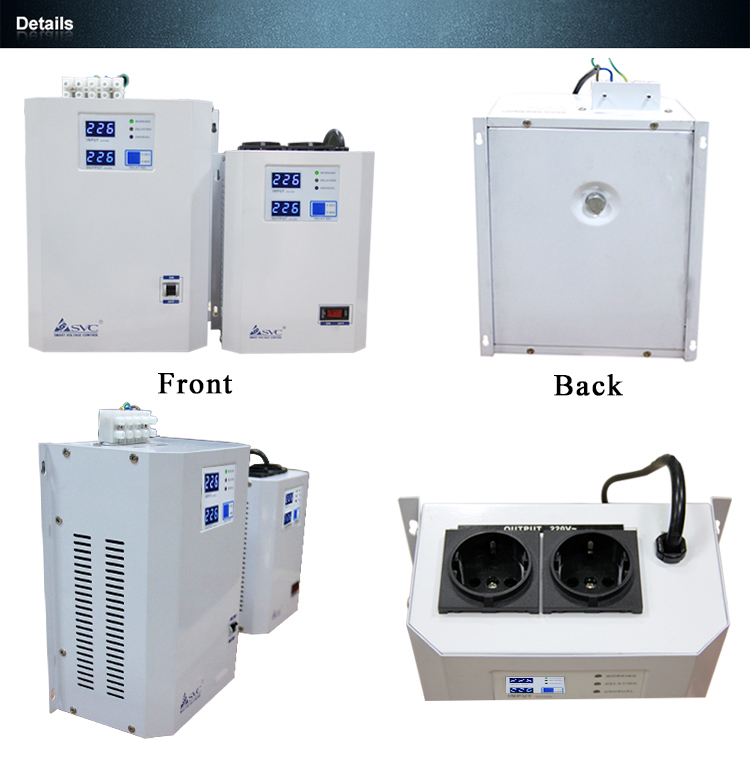
- Q: What are the financial benefits of installing a solar energy system?
- Installing a solar energy system offers several financial benefits, including reduced electricity bills as solar power generates free electricity from the sun. Additionally, solar panels can generate excess electricity that can be sold back to the grid, potentially earning homeowners a profit. Moreover, installing solar energy systems can provide tax incentives, such as federal tax credits, and in some cases, local rebates or grants. Over time, solar panels can increase the value of a property, making it a wise long-term investment.
- Q: What is the role of solar tracking systems in maximizing solar energy capture?
- The role of solar tracking systems in maximizing solar energy capture is to continuously orient solar panels or mirrors towards the sun, ensuring that they receive maximum sunlight throughout the day. By tracking the sun's movement, these systems optimize the angle and position of the solar panels, which results in a higher efficiency of solar energy absorption. This technology helps increase the overall energy output and improves the return on investment of solar power systems.
- Q: How does the angle of a solar panel affect its performance in different seasons?
- The performance of a solar panel in different seasons is greatly influenced by its angle. Also known as the tilt or inclination, the angle refers to the position of the solar panel in relation to the ground. Typically, the ideal angle for a solar panel varies depending on the location and time of year. In regions closer to the equator, where the sun is directly overhead all year round, the optimal angle is usually close to 0 degrees (horizontal) or a slight tilt towards the equator. During the summer solstice, when the sun is at its highest point in the sky, a solar panel with the right tilt angle will receive maximum sunlight and perform at its best. This is because the sun's rays are more perpendicular to the panel's surface, resulting in greater absorption of solar energy. On the other hand, during the winter solstice, the sun is at a lower angle in the sky, causing less direct sunlight. In this situation, a solar panel with a steeper tilt angle can capture more sunlight by aligning itself more closely with the sun's rays. By adjusting the angle to be more vertical, the panel can maximize its exposure to sunlight and maintain a higher level of performance. In regions with distinct seasonal changes, it can be advantageous to use an adjustable mounting system that allows for the optimization of the solar panel's angle throughout the year. This allows the panel to be tilted towards the ideal angle for each season, resulting in consistent and efficient energy generation. However, it's essential to consider that the angle is just one of many factors that affect the performance of a solar panel. Other factors, such as weather conditions, shading, and the efficiency of the solar cells, also play a significant role. Therefore, when designing an effective solar power system, the angle should be taken into account alongside these other parameters.
- Q: Can solar energy systems be used in areas with limited access to solar charge controllers?
- Yes, solar energy systems can still be used in areas with limited access to solar charge controllers. While solar charge controllers are important for regulating and managing the charging and discharging of batteries in solar energy systems, there are alternative methods for controlling and optimizing the charging process. These can include the use of manual charge controllers or voltage regulators, as well as implementing proper battery management techniques to prevent overcharging or deep discharging. Additionally, advancements in technology have led to the development of more efficient and resilient solar panels, which can help mitigate the limitations of limited access to charge controllers in such areas.
- Q: What are the benefits of using solar energy systems?
- There are several benefits of using solar energy systems. Firstly, they are a renewable source of energy, meaning that they can generate electricity without depleting natural resources. Secondly, solar energy systems produce clean energy, as they do not emit any greenhouse gases or pollutants during operation, contributing to a healthier environment. Additionally, solar energy systems can help reduce electricity bills, as they provide a cost-effective way of generating electricity for homes or businesses. Finally, installing solar panels can also increase the value of a property and create job opportunities in the renewable energy sector.
- Q: Can a solar energy system power an entire home?
- A whole home can be powered by a solar energy system. With advancements in solar technology, generating enough electricity from solar panels to meet the energy needs of a typical household is now possible. The system consists of solar panels that convert sunlight into electricity, an inverter that transforms the DC electricity generated by the panels into AC electricity for use in the home, and a battery storage system to store excess energy for use during periods of low sunlight or cloudy weather. The size and capacity of the solar energy system will vary depending on the energy requirements of the home. Factors such as the number of people living in the house, energy consumption habits, and the amount of sunlight in the area will determine the number of solar panels needed. Conducting a comprehensive energy audit is crucial to determine the appropriate system size. By installing a solar energy system, homeowners can greatly reduce or eliminate their reliance on the traditional electrical grid. In some cases, surplus electricity generated by the system can be sold back to the grid, resulting in potential cost savings. Moreover, solar energy is a clean and renewable source of power, which reduces carbon emissions and benefits the environment. However, it is important to note that various factors, including the location and orientation of the panels, the amount of sunlight available, and the weather conditions, can affect the efficiency and effectiveness of a solar energy system. Therefore, it is advisable to consult a professional solar installer to design and install a system that meets the specific needs of the home.
- Q: Can solar energy systems be used in areas with limited access to education?
- Yes, solar energy systems can be used in areas with limited access to education. Solar energy systems are relatively simple to install and maintain, requiring basic technical knowledge that can be taught through practical training programs. Additionally, solar energy technology is becoming increasingly user-friendly and accessible, with the availability of pre-packaged kits and simplified installation instructions. By providing education and training opportunities tailored to the specific needs of these communities, solar energy systems can empower individuals and communities to adopt renewable energy solutions and improve their quality of life.
- Q: How much does it cost to install a solar energy system?
- The cost to install a solar energy system can vary depending on several factors such as the size of the system, location, type of panels, and installation complexity. On average, a residential solar energy system can range from $10,000 to $30,000 after considering incentives and rebates. It is recommended to get multiple quotes from reputable solar providers to determine the specific cost for your individual needs.
- Q: What is the role of solar energy systems in reducing dependence on fossil fuels?
- The use of solar energy systems is vital in decreasing reliance on fossil fuels as they offer a clean and renewable energy source. For centuries, coal, oil, and natural gas have been the primary sources of energy; however, their extraction, transportation, and combustion have had significant environmental effects, including air pollution, greenhouse gas emissions, and climate change. Conversely, solar energy systems utilize the sun's power to generate electricity. Solar panels, composed of photovoltaic cells, convert sunlight into usable energy without emitting harmful pollutants. This clean energy source not only helps combat climate change but also enhances air quality and reduces health hazards associated with burning fossil fuels. By adopting solar energy systems, we can lessen our dependence on fossil fuels for electricity generation, heating, and cooling. Solar power is abundant, widely available throughout the year, and can be relied upon, making it a dependable and sustainable energy option. Moreover, solar energy systems can be installed on various scales, from residential rooftops to large-scale solar farms, allowing individuals, communities, and businesses to contribute to the shift away from fossil fuels. Solar energy not only decreases our carbon footprint but also provides economic advantages. As technology advances and becomes more widespread, the cost of solar panels and installation continues to decrease. This makes solar energy more affordable and accessible for both individuals and businesses, leading to job creation and economic growth in the renewable energy sector. Additionally, solar energy systems offer energy independence and resilience. Unlike finite fossil fuel resources that are subject to price volatility, sunlight is abundant and freely available. By harnessing solar power, we can reduce our dependence on imported fossil fuels, strengthen energy security, and establish a more stable and sustainable energy supply. In conclusion, solar energy systems have a critical role in reducing reliance on fossil fuels. By harnessing the sun's power, we can transition to a cleaner, more sustainable, and resilient energy future. Solar energy aids in mitigating climate change, improving air quality, creating jobs, and providing energy independence. It is a viable solution that allows us to decrease our environmental impact while meeting our energy requirements.
- Q: Can solar energy systems be used for powering electric vehicle solar charging stations at airports?
- Yes, solar energy systems can definitely be used for powering electric vehicle (EV) solar charging stations at airports. Solar panels can be installed on the roofs of parking structures or on the ground near the charging stations to capture sunlight and convert it into electricity. This electricity can then be used to power the EV charging stations, providing a clean and sustainable source of energy. Using solar energy to power EV charging stations at airports offers several benefits. Firstly, it reduces the reliance on fossil fuels and decreases greenhouse gas emissions, contributing to a more sustainable and environmentally friendly transportation system. Secondly, it helps airports meet their renewable energy goals and reduce their carbon footprint. Additionally, solar-powered charging stations can provide a reliable source of electricity even during power outages or grid failures, ensuring uninterrupted charging services for electric vehicles. Moreover, airports are typically large open spaces with ample sunlight, making them ideal locations for solar installations. With proper planning and design, solar panels can be integrated seamlessly into the airport infrastructure, maximizing the energy generation potential. This can help airports become more energy independent and reduce their operating costs by generating their own electricity. In conclusion, solar energy systems are a viable and effective solution for powering electric vehicle solar charging stations at airports. By harnessing the power of the sun, airports can provide clean and sustainable energy for EVs, contributing to a greener transportation system and a more sustainable future.
Send your message to us
Redsun Solar Energy Systems Voltage Regulator/Home SVC Wall Mount 3000VA 220V AC
- Loading Port:
- China main port
- Payment Terms:
- TT OR LC
- Min Order Qty:
- 100 carton
- Supply Capability:
- 10000 carton/month
OKorder Service Pledge
OKorder Financial Service
Similar products
Hot products
Hot Searches
Related keywords
